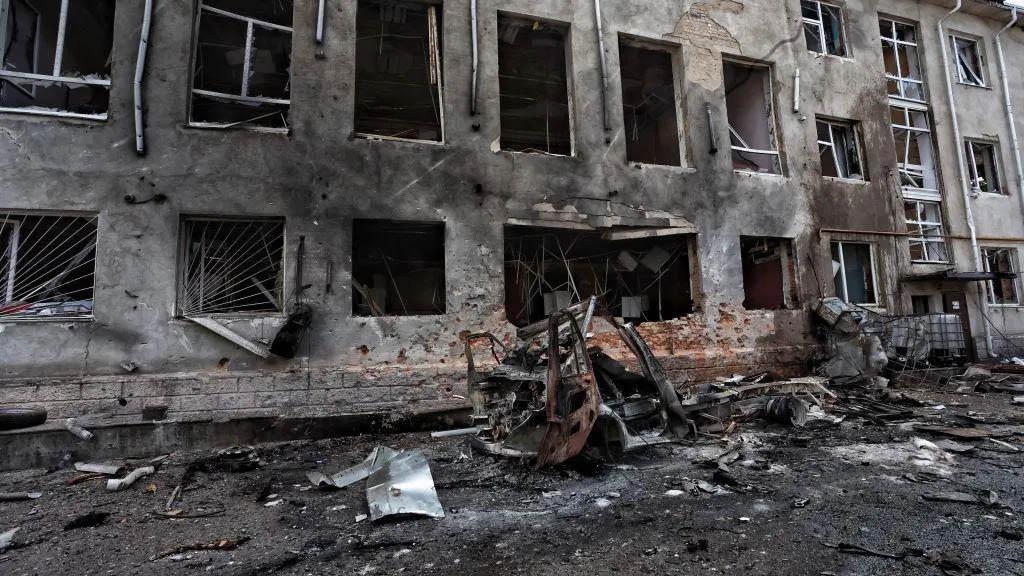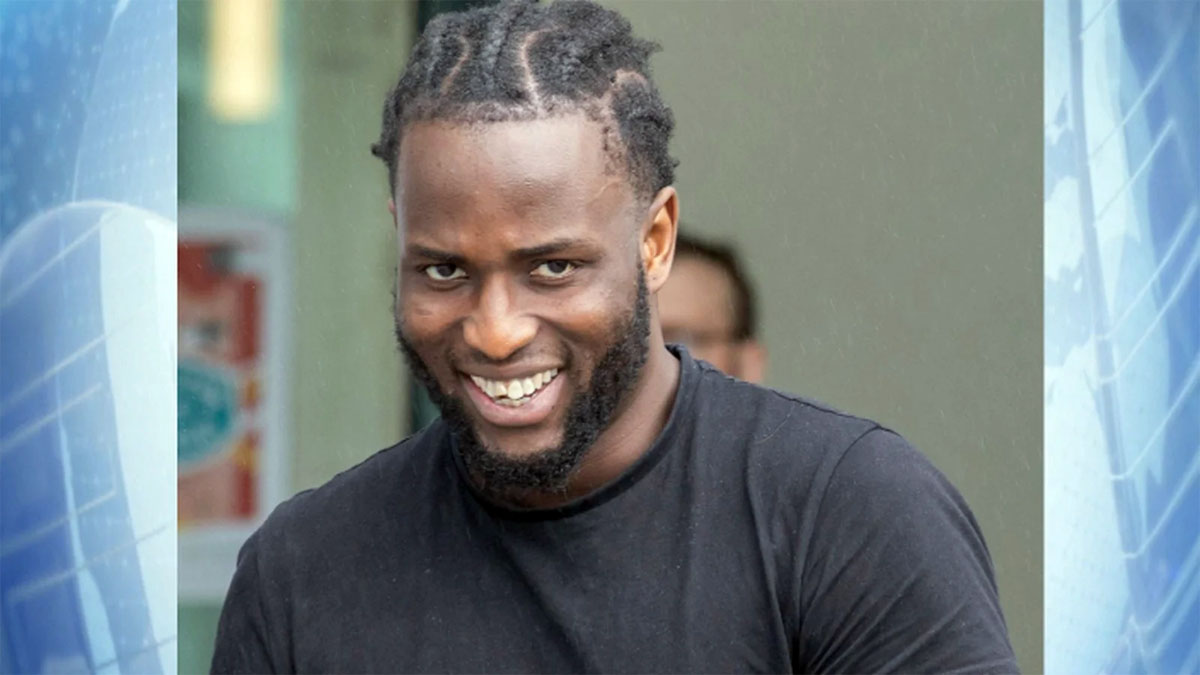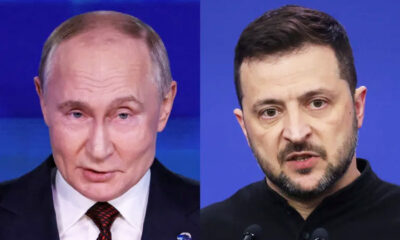International
Russia pushes on key Ukraine city while Kyiv’s Kursk incursion slows

Russia pushes on key Ukraine city while Kyiv’s Kursk incursion slows
Russia has made sweeping advances in recent days that threaten to outweigh the gains made by Ukraine in its cross-border attack into the Kursk region.
Russian forces are just a few kilometres from the Ukrainian city of Pokrovsk, a crucial logistics hub used by the Ukrainian military.
Home to a key railway station and major roads, Pokrovsk is an essential supply and reinforcement point for Ukraine’s troops on the eastern front line.
Critics in Kyiv fear that the country’s military has made a serious miscalculation.
By sending troops into Kursk instead of reinforcing the eastern frontline, the military has left Pokrovsk and other important Ukrainian towns exposed, these critics say.
Russian President Vladimir Putin launched a full-scale invasion of Ukraine in February 2022.
On a visit to the front line, Ukraine’s armed forces chief Gen Oleksandr Syrskyi said Russia was throwing “everything that can move” into its assault.
“The situation is extremely difficult,” Ukrainian President Volodymyr Zelensky conceded on Wednesday.
“If we lose Pokrovsk,” military expert Mykhaylo Zhyrokhov warned, “the entire front line will crumble.”
Why Pokrovsk matters
Pokrovsk is next to another town, Myrnohrad. Together, the two settlements had a pre-war population of over 100,000, most of whom have now fled. They are the last major cities in that part of the Donetsk region that remain under Ukrainian control.
READ ALSO:
- Reactions as singer Timaya accuses apostle Suleman of lying
- Wike threatens PDP govs backing Fubara, says ‘I’ll put fire in your states’
- Napoli in U-turn withdraw Osimhen number 9 jersey from Lukaku
The battle for Pokrovsk is really a continuation of the battle for Avdiivka, which Ukraine lost in February after months of bloody fighting.
Avdiivka, which is about 40km (25 miles) south-east of Pokrovsk, was seen as a fortress that protected the settlements and roads to its west – helping to bolster Ukraine’s presence along the entire frontline.
When it finally fell, Avdiivka was left in ruins. It was a serious loss for Ukraine.
It meant that Russia could move its focus to Pokrovsk and the key hilltop town of Chasiv Yar, which overlooks some of the important cities in Donetsk still under Ukrainian control. Intense fighting there on Saturday left five people dead.
For weeks now a mass evacuation of Ukrainian civilians from Pokrovsk has been under way, with thousands said to have left already.
Gen Syrskyi said he was working “to strengthen the defence of our troops in the most difficult areas of the front, to provide the brigades with a sufficient amount of ammunition and other material and technical means”.
How Russia’s advance gathered speed
Russia has long held Pokrovsk as one of its key objectives. For months its forces have slowly ground towards it.
Experts believe Moscow has deployed around one third of its Central Army Group, or about 30,000 troops, to the offensive – as well as its most battle-ready reserves.
This week, it took the Ukrainian town of Novohrodivka, infuriating some in Ukraine who felt it should have been better defended.
“The trenches in front of Novohrodivka were empty. There was practically no Ukrainian army in the once 20,000-strong city,” Ukrainian MP Mariana Bezuhla wrote on Facebook.
With its forces undermanned and outnumbered, it is believed the Ukrainian military withdrew from Novohrodivka to strengthen its defence of Pokrovsk.
READ ALSO:
- Double promotion, cash reward for cleaner who returned $10,000 found in aircraft
- Kidnappers threaten to kill 27-year-old Kogi man, family seeks assistance
- Ajayi Crowther University celebrates media expert, Sunday Saanu
“The Ukrainian command likely deemed the defence of Novohrodivka not worth the potential losses,” said the Washington-based Institute for the Study of War (ISW).
Elsewhere, Russian forces have launched assaults on the town of Selidove, just south of Novohrodivka, and other areas of the Donetsk region nearby.
The Russian offensive has been helped by a shift in tactics, which are increasingly mirroring those used earlier in the war by the Wagner mercenary group.
Ukrainian forces report coming up against wave after wave of Russian infantry sent forwards in an attempt to storm their positions.
Some have dubbed these tactics “meat assaults”.
The tactics – though costly – quickly exhaust Ukrainian units forced to fend off constant attacks.
Armoured vehicles are used sparingly – complicating the task of Ukrainian tanks and artillery, which have little to aim at on the battlefield.
Russia has also been using powerful glide bombs, forcing Ukraine to disperse its units when shelling begins and sometimes even withdraw troops from the front line.
International
UK-Based Nigerian Gets 13-Year Jail Term for Forcing Girlfriend to Abort Pregnancy

UK-Based Nigerian Gets 13-Year Jail Term for Forcing Girlfriend to Abort Pregnancy
A UK-based Nigerian man, Adeleke Adelani, has been sentenced to more than 13 years’ imprisonment for unlawfully aborting the pregnancy of his former partner after coercing her to take abortion medication on Valentine’s Day.
The offence occurred in 2020 when Adelani, then 28 years old, deceptively invited the woman — whose identity is legally protected — to his residence in Letterkenny under the guise of discussing the future of her pregnancy. Evidence before the court showed that the victim was nine weeks pregnant at the time of the incident.
Prosecutors told the court that upon her arrival, Adelani threatened the woman with violence and forced her to ingest five tablets of misoprostol, a drug used for medical abortions, thereby causing the unlawful termination of the pregnancy. The court heard that the defendant had researched the medication in advance and acted deliberately. The victim later contacted authorities, leading to Adelani’s arrest by Irish police.
READ ALSO:
- Lawmaker Jailed for Mocking President in Facebook Post
- Police to Arrest TikToker Mirabel After She Recants False Rape Claim
- Tinubu Reduces Reliance on U.S, Strengthens Defence Partnerships With Turkey, EU
At the time of the sentencing, Adelani was already serving a separate seven-year prison sentence for an unrelated offence. He had initially been due to stand trial last year but pleaded guilty before jury selection began, accepting responsibility for the charges brought against him.
During the sentencing hearing at the Letterkenny Circuit Court, the victim delivered a powerful impact statement, explaining that although she had chosen to forgive Adelani, the consequences of his actions would remain with her for life.
“I have forgiven the defendant,” she told the court. “That forgiveness does not mean what he did was acceptable. It means I refuse to let what he did continue to control my heart and my life. When he wrongfully imprisoned me and caused the termination of my nine-week pregnancy, he took far more than my freedom. He took my child. He took my sense of safety. He took a future that I had already begun to plan and love.”
In a letter read aloud in court, Adelani apologised to the victim, accepted full responsibility for his actions, and expressed remorse for the pain and trauma he caused.
Delivering judgment, John Aylmer described the crime as deliberate, premeditated, and deeply traumatic, stressing that it involved coercion, abuse, and a serious violation of trust. The judge sentenced Adelani to 11 years in prison, with the final two years suspended, for causing the unlawful termination of a pregnancy, and an additional five years, with the last 12 months suspended, for assault causing harm.
The sentences are to run concurrently, adding to Adelani’s existing term and resulting in an overall prison sentence exceeding 13 years. The case has reignited debate in Ireland and internationally about reproductive coercion, domestic abuse, and violence against women, with legal observers describing it as one of the most serious cases of its kind in recent years.
UK-Based Nigerian Gets 13-Year Jail Term for Forcing Girlfriend to Abort Pregnancy
International
Epstein, Ex-Israeli PM Named in Alleged Profiteering From Boko Haram Crisis

Epstein, Ex-Israeli PM Named in Alleged Profiteering From Boko Haram Crisis
A new investigative report by Drop Site News has alleged that the late American financier Jeffrey Epstein and former Israeli prime minister Ehud Barak leveraged Nigeria’s long-running Boko Haram insurgency to pursue commercial, security, and strategic interests in the country.
According to the investigation, emails released by the United States Department of Justice in 2018 show Epstein acting as a behind-the-scenes facilitator in discussions involving Jide Zeitlin, then chairman of Nigeria’s Sovereign Investment Authority, and Sultan Ahmed bin Sulayem, former chairman of DP World. The exchanges allegedly focused on attempts to secure control of key shipping terminals in Lagos and Badagry, following unsuccessful negotiations with successive Nigerian administrations dating back to 2005.
The report claims DP World was unwilling to invest in a proposed industrial zone in Nigeria without full or majority control of the adjoining port infrastructure, a demand that reportedly stalled the deal for years. Epstein, who died in a New York jail in 2019 while awaiting trial, is alleged to have helped revive talks by brokering introductions and strategic conversations.
READ ALSO:
- CBN Policies, Foreign Inflows Drive Naira to Two-Year Peak
- Edo Governor Okpebholo Names Mercy Johnson-Okojie Special Adviser
- Many Feared Dead as Suspected Lakurawa Militants Attack Kebbi Communities
Drop Site News further reported that bin Sulayem resigned on February 13 after renewed scrutiny of his past links to Epstein resurfaced publicly, intensifying attention on the historical port negotiations and the role of foreign intermediaries in Nigeria’s maritime sector.
Beyond logistics and port infrastructure, investigators highlighted what they described as near-daily correspondence between Epstein and Barak after the former Israeli leader left public office. Barak, who served as Israel’s defence minister until 2013, allegedly sought to deepen Israeli-Nigerian security cooperation, using Nigeria’s counter-insurgency battle as an entry point for Israeli-linked security, energy, and technology investments.
The report said Barak later relied on security networks in Nigeria to promote Israeli defence and surveillance firms. In 2015, Barak and a partner invested $15 million in FST Biometrics, founded by former Israeli intelligence chief Aharon Ze’evi Farkash. The firm’s Basel biometric system, originally deployed at Israel-Gaza crossings, was subsequently marketed in Nigeria as a counter-terrorism solution.
According to the investigation, the biometric technology was introduced at Babcock University as protection against Boko Haram threats, while also being pitched to African governments for broader identity management and population-control applications.
The report further cited a 2020 World Bank-supported initiative involving Israel’s National Cyber Directorate and Toka Group, a cyber-intelligence company co-founded by Barak. The partnership was presented as contributing to Nigeria’s national cybersecurity framework, but Drop Site News argued it also deepened Israeli corporate access to sensitive security architecture.
In its conclusion, the investigation alleged that a network of security interventions, port negotiations, and technology investments enabled Epstein and Barak to profit from instability associated with the Boko Haram conflict, while simultaneously advancing Israeli commercial and strategic interests in Nigeria. The outlet stressed that these claims are based on document reviews and correspondence, framing them as allegations rather than established legal findings.
Epstein, Ex-Israeli PM Named in Alleged Profiteering From Boko Haram Crisis
International
Canada Opens New Express Entry Draw for Nigerian Workers, Others

Canada Opens New Express Entry Draw for Nigerian Workers, Others
The Government of Canada has announced a new Express Entry draw, offering fresh opportunities for skilled workers from Nigeria and other eligible countries to obtain Canadian permanent residency. The latest draw underscores Canada’s ongoing efforts to attract global talent to meet labour market demands and support economic growth.
According to Immigration, Refugees and Citizenship Canada (IRCC), the new round of invitations targets candidates under the Federal Skilled Worker Program, the Federal Skilled Trades Program, and the Canadian Experience Class, all managed through the Express Entry system. Eligible applicants are ranked through the Comprehensive Ranking System (CRS), with higher scores increasing the likelihood of receiving an Invitation to Apply (ITA) for permanent residency.
READ ALSO:
- South Korea Former President Park Geun-hye Jailed for Life Over Martial Law Attempt
- Hisbah Arrests Nine Muslims for Allegedly Breaking Ramadan Fast in Kano
- Ondo Monarch Killed as Bandits Strike Akure North
This development is particularly significant for Nigerian workers, who have increasingly sought opportunities in Canada due to strong employment prospects, favourable immigration policies, and the country’s high standard of living. Applicants are advised to update profiles, review eligibility criteria, and submit supporting documents promptly, as IRCC draws often target candidates with competitive CRS scores.
The Express Entry system remains a primary pathway for skilled migration, with Canada aiming to meet ambitious immigration targets in 2026. The federal government has emphasized that these draws are part of a broader strategy to boost the Canadian workforce while supporting diversity and inclusion within the country’s labour market.
Canada has historically welcomed Nigerians in sectors including information technology, healthcare, engineering, and skilled trades, and this draw continues to open doors for qualified professionals seeking permanent residence.
Launched in 2015, Express Entry is a points-based immigration system designed to attract highly skilled foreign workers. Applicants are evaluated on education, work experience, language proficiency, and other factors. Candidates with the highest CRS scores are invited to apply for permanent residency, allowing them to live and work anywhere in Canada.
Express Entry draws occur regularly, and eligibility requirements may vary by program and draw. Skilled workers from Nigeria and other countries are encouraged to maintain updated profiles to maximize chances of selection.
Canada Opens New Express Entry Draw for Nigerian Workers, Others
-

 News3 days ago
News3 days agoSaudi Arabia Confirms Sighting of Ramadan Crescent, Fasting Begins Wednesday
-

 metro3 days ago
metro3 days agoLagos Woman Shares Ordeal After Alleged Rape, Sparks Nationwide Outcry
-

 News3 days ago
News3 days agoRamadan Begins in Nigeria as Sultan Confirms Crescent Sighting
-

 International1 day ago
International1 day agoCanada Opens New Express Entry Draw for Nigerian Workers, Others
-

 metro3 days ago
metro3 days agoSeven Killed in Horrific Crash at Ota Toll Gate
-

 News2 days ago
News2 days agoKorope Drivers Shut Down Lekki–Epe Expressway Over Lagos Ban (Video)
-

 Health2 days ago
Health2 days agoRamadan Health Tips: Six Ways to Stay Hydrated While Fasting
-

 News7 hours ago
News7 hours agoPolice to Arrest TikToker Mirabel After She Recants False Rape Claim















